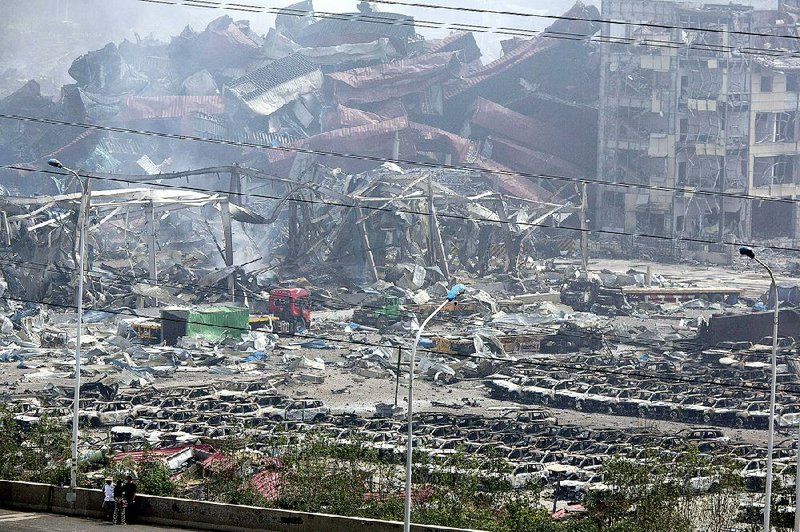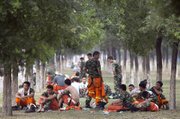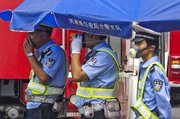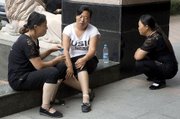BEIJING -- A new round of explosions and fires hit the Chinese port city of Tianjin on Saturday, pouring at least three plumes of black smoke into the sky.
Confusion also set in over whether authorities had ordered the evacuation of a 2-mile zone around the hazardous-chemicals warehouse that exploded last week.
Firefighters and hazardous-materials teams have struggled to get the situation in the Binhai New Area under control for days, and criticism is mounting over multiple aspects of the disaster. The death toll has risen to 112 people, with more than 700 injured. At least 21 firefighters have died.
According to the People's Daily, the official newspaper of the Chinese Communist Party, the identities of only 28 of the 112 victims could be confirmed; DNA tests will be performed on the rest.
The state-run New China News Agency and other official news outlets reported about 2 p.m. local time that authorities had ordered the evacuation of a 2-mile zone around the blast site. But at a news conference three hours later, a Tianjin official denied there was any evacuation order, a denial that was later reported by People's Daily and other official outlets. Journalists at the scene quoted residents as saying they had been told to evacuate.
Meanwhile, family members of some emergency workers confronted Tianjin officials Saturday morning at a news conference. Some said their relatives were contract employees -- not full-fledged firefighters -- and have not been accounted for in the official death and injury tolls. Authorities denied that was the case.
"I don't know where my son is. I've no clues. If he is alive, I want to see him. If he is dead, I need to see his body," Liu Huan told the English-language daily newspaper China Daily. Liu's 22-year-old son, Liu Chuntao, was part of the first group of firefighters sent to the scene.
A police official at the news conference, seeking to calm the crowd, expressed empathy.
"Not a single police officer death has been reported," he told them. "Everyone from our whole police station is gone."
More than three days after the initial blasts, authorities have been unable to identify the toxic chemicals smoldering at the site of the destroyed warehouse, a temporary depot for substances that are some of the chemical industry's most volatile and toxic.
On Saturday, Chinese news outlets reported that a customs authority inventory did not match the list of stored goods provided by Rui Hai employees, suggesting the company may have been illegally transporting chemicals.
"Some relevant people indicated that the differences in the information point to the possibility of smuggling," the newsmagazine Caijing wrote on its website.
Investigators have confirmed only the presence of sodium cyanide, a highly toxic substance that has seeped into drainage pipes beneath the port facilities. A report in The Beijing News said Rui Hai was illegally storing some of the chemicals outdoors in "metal buckets and wooden crates."
According to the U.S. Centers for Disease Control and Prevention, sodium cyanide can release hydrogen cyanide gas, a highly toxic chemical asphyxiant that interferes with the body's ability to use oxygen.
Exposure to sodium cyanide can be fatal, the CDC said; hydrogen cyanide gas released by sodium cyanide has a distinctive odor described by some people as bitter almond or a musty "old sneakers smell," but many people cannot detect it.
The operator of a chemical plant in Hebei province said his company had delivered 700 tons of sodium cyanide to the warehouse where the blasts occurred, even though the warehouse was permitted to store only up to 10 tons of the hazardous material, the Science Daily and other news outlets reported. Authorities were amassing tons of hydrogen peroxide to neutralize the sodium cyanide.
Conflicting reports about evacuations and the appearance of hazardous-materials squads on the scene added to fears about the health hazards for residents. State-run television has shown footage of teams in gas masks and protective suits tromping through the disaster area, trying to determine what toxic substances were present, although those specialists apparently did not arrive on the scene until about 36 hours after the initial blasts late Wednesday.
Experts have expressed concern about forecasts of rain, saying precipitation could spread the contamination beyond the immediate blast zone. In addition to sending a team of hazardous-materials experts, the authorities have been trying to prevent rain from falling on the area, state media said, presumably by firing silver-iodide rockets into approaching storm clouds.
Among those reportedly sent to help identify the chemicals were employees of the agency that manages the sprawling port. In a posting on WeChat, a popular messaging app, one man expressed alarm that his wife and her co-workers were being trained to survey areas outside the disaster's epicenter for stray chemicals.
"It was ordered by the chairwoman of Tianjin Port, who is betting the health and lives of ordinary employees just for her political career," wrote the man, who declined to give his name during a brief phone conversation, saying he did not want to endanger his wife's job.
Authorities had said the main fire was extinguished by 6 p.m. Friday, according to the New China News Agency. It was unclear why or how new explosions and fires ignited Saturday.
Video footage carried by state-run media showed that at least one of the fires appeared to be burning cars in a parking lot just south of the blast site. The new vehicles were awaiting shipment to dealerships around China and already had been damaged in the initial blasts.
Fire officials said they had mobilized 66 forklifts, as well as cranes, excavators and armed police trucks, to deal with the situation, and had transported 600 tons of sand to the area that could be used to extinguish hot spots.
Authorities have called the complexity and scale of the explosions unprecedented and said it's the deadliest disaster for firefighters since the founding of Communist China in 1949.
Neither President Xi Jinping nor Premier Li Keqiang -- who is often dispatched to the site of major disasters -- has visited Tianjin yet. Xi on Saturday ordered officials to learn from the "extremely profound" lessons that have been "paid for with blood."
China, he said, needs greater accountability, better emergency response mechanisms, better implementation of work-safety regulations and careful checks of all possible safety risks.
The full economic toll of the disaster has yet to be calculated. But Sun Jiuwen, a professor of regional economy at People's University in Beijing, said the effect on Tianjin's economy could be grave in the short term.
"Even if we put aside the direct losses, including casualties, cargoes and infrastructure damage, the tragedy will severely strike the local economy, which heavily relies on the chemical, port and logistics industries," he told China Daily.
Propaganda officials aggressively managed news coverage of the disaster. State media Saturday featured tales of heroism and survival. One such tale was of the rescue of a 56-year-old man from a container just 150 feet from the blast site Saturday, state-run China Central Television reported.
Photos from the scene showed troops in camouflage protective gear and gas masks carrying the shirtless man to safety on a stretcher. He was later reported to be in stable condition.
Censors also worked to delete social-media posts criticizing the paucity of information or suggesting an official cover-up.
On Saturday, the Cyberspace Administration of China said it had suspended or shut down 360 social-media accounts for spreading rumors and misinformation about the catastrophe, according to Xinhua. Among those punished were "star bloggers" accused of causing "panic by comparing the blast to the atomic bombs dropped on Hiroshima and Nagasaki."
Pope Francis, meanwhile, offered his prayers to the victims of the disaster. "I assure my prayers for those who lost their lives and for all those persons tried by this disaster," he said Saturday in remarks to thousands of people gathered in St. Peter's Square.
Francis made the remarks despite a tense relationship between Beijing and the Vatican.
Information for this article was contributed by Julie Makinen of the Los Angeles Times; by Andrew Jacobs and Yufan Huang of The New York Times; and by Christopher Bodeen, Didi Tang, Ian Mader and Frances D'Emilio of The Associated Press.
A Section on 08/16/2015



